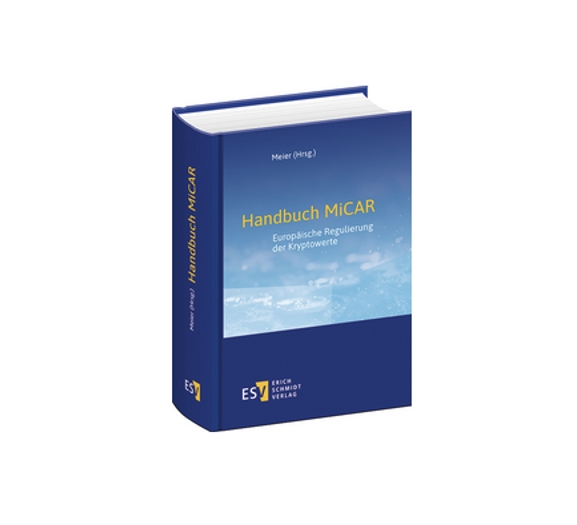-
 Interoperability Through Token Bridges – Are Wrapped Tokens Crypto Assets under MiCAR?
Interoperability Through Token Bridges – Are Wrapped Tokens Crypto Assets under MiCAR?
How are wrapped tokens and token bridges regulated under MiCAR? What obligations apply to providers and issuers and are there possibilities to realize a token bridge outside the scope of MiCAR?
-
 Attorney Anja von Rosenstiel Contributes Chapter to MiCAR Handbook
Attorney Anja von Rosenstiel Contributes Chapter to MiCAR Handbook
Attorney Anja von Rosenstiel, LL.M. (Boston University), M.A. (Viadrina) and of counsel at FIN LAW, has provided a comparative legal analysis of the MiCAR with US regulations in the handbook MiCAR, edited by Johannes Meier, which is expected to be published in February 2025.
-
 Attorney Lutz Auffenberg Comments on Art. 36 to 47 MiCAR in Kalss/Krönke/Völkel
Attorney Lutz Auffenberg Comments on Art. 36 to 47 MiCAR in Kalss/Krönke/Völkel
Attorney Lutz Auffenberg Comments on Art. 36 to 47 MiCAR in Kalss/Krönke/Völkel
-
 Attorney Lutz Auffenberg LL.M. (London) as Guest in Web3 NextLevel Podcast
Attorney Lutz Auffenberg LL.M. (London) as Guest in Web3 NextLevel Podcast
Our partner, Attorney Lutz Auffenberg, LL.M. (London) was a guest on André and Jasmin’s Web3 NextLevel podcast and talked about crypto regulation in Europe.
-
 MICAR Transition Without National Framework Legislation – What Happens if the German Parliament Does Not Pass the KMAG by the End of the Year?
MICAR Transition Without National Framework Legislation – What Happens if the German Parliament Does Not Pass the KMAG by the End of the Year?
The German government has broken up. But what does this mean for the long-delayed adoption of the accompanying legislation for the MiCAR transition and which legal framework will the German crypto industry operate within as of 30 December 2024?
-
 MiCAR and Non-EU CASPs – How Can Crypto Service Providers from Third Countries Do Business in Europe?
MiCAR and Non-EU CASPs – How Can Crypto Service Providers from Third Countries Do Business in Europe?
Crypto service providers from non-European countries such as the USA, Switzerland and the UK are also interested in doing business on the old continent under MiCAR. However, ESMA is making it more difficult for such companies to enter the market with its recommendations to the relevant national supervisory authorities.
-
 Market Abuse and Insider Trading in Crypto Assets – Who Will be Affected By the New MiCAR Rules?
Market Abuse and Insider Trading in Crypto Assets – Who Will be Affected By the New MiCAR Rules?
In a few months, all MiCAR provisions will be legally effective. This also includes the new rules on the prevention and prohibition of market abuse and insider trading. But which market participants must comply with the new strict obligations?
-
 MiCAR vs MiFID II – Which Tokens Are Considered Crypto Assets and Which Are Financial Instruments?
MiCAR vs MiFID II – Which Tokens Are Considered Crypto Assets and Which Are Financial Instruments?
ESMA has been tasked with providing guidelines by the end of the year to facilitate the legal assessment of the legal nature of tokens as crypto assets under MiCAR and as financial instruments under MiFID2. ESMA has already published an initial draft of the guidelines.
-
 Reverse Solicitation – Does MiCAR also Apply to Crypto Service Providers from Third Countries?
Reverse Solicitation – Does MiCAR also Apply to Crypto Service Providers from Third Countries?
Under MiCAR, it will be practically impossible for crypto service providers from the USA, Switzerland or other third countries to serve European customers without a MiCAR license on the grounds of passive freedom to provide services. What exceptions will remain?
-
 Crypto Advisory Under MiCAR – Will Referrers Need a BaFin License in the Future?
Crypto Advisory Under MiCAR – Will Referrers Need a BaFin License in the Future?
Under the regime of the new MiCAR, crypto advice will be subject to authorization. However, this includes not only advice on transactions with crypto assets, but also advice on the use of crypto services. What are the implications for referrers?
-
 Incorrect Crypto Whitepaper According to MiCAR – What are the Consequences?
Incorrect Crypto Whitepaper According to MiCAR – What are the Consequences?
MiCAR will to full extent enter into effect at the end of this year. Then, also the provisions on crypto asset whitepapers of MiCAR will become applicable. But what consequences will then have the publication of an incorrect whitepaper?
-
 Getting Ready for MiCAR – BMF Proposes Two New Regulations for the Transition to MiCAR
Getting Ready for MiCAR – BMF Proposes Two New Regulations for the Transition to MiCAR
At the beginning of April 2024, the Federal Ministry of Finance published two new regulations for consultation, the MiCAR-TransitV and the MiCAR-AntragsV, which are intended to regulate the transition to the MiCAR-regime for CASPs. as of when can applications be submitted to BaFin?
 Interoperability Through Token Bridges – Are Wrapped Tokens Crypto Assets under MiCAR?
How are wrapped tokens and token bridges regulated under MiCAR? What obligations apply to providers and issuers and are there possibilities to realize a token bridge outside the scope of MiCAR?
Interoperability Through Token Bridges – Are Wrapped Tokens Crypto Assets under MiCAR?
How are wrapped tokens and token bridges regulated under MiCAR? What obligations apply to providers and issuers and are there possibilities to realize a token bridge outside the scope of MiCAR? Attorney Anja von Rosenstiel Contributes Chapter to MiCAR Handbook
Attorney Anja von Rosenstiel, LL.M. (Boston University), M.A. (Viadrina) and of counsel at FIN LAW, has provided a comparative legal analysis of the MiCAR with US regulations in the handbook MiCAR, edited by Johannes Meier, which is expected to be published in February 2025.
Attorney Anja von Rosenstiel Contributes Chapter to MiCAR Handbook
Attorney Anja von Rosenstiel, LL.M. (Boston University), M.A. (Viadrina) and of counsel at FIN LAW, has provided a comparative legal analysis of the MiCAR with US regulations in the handbook MiCAR, edited by Johannes Meier, which is expected to be published in February 2025. Attorney Lutz Auffenberg Comments on Art. 36 to 47 MiCAR in Kalss/Krönke/Völkel
Attorney Lutz Auffenberg Comments on Art. 36 to 47 MiCAR in Kalss/Krönke/Völkel
Attorney Lutz Auffenberg Comments on Art. 36 to 47 MiCAR in Kalss/Krönke/Völkel
Attorney Lutz Auffenberg Comments on Art. 36 to 47 MiCAR in Kalss/Krönke/Völkel Attorney Lutz Auffenberg LL.M. (London) as Guest in Web3 NextLevel Podcast
Our partner, Attorney Lutz Auffenberg, LL.M. (London) was a guest on André and Jasmin’s Web3 NextLevel podcast and talked about crypto regulation in Europe.
Attorney Lutz Auffenberg LL.M. (London) as Guest in Web3 NextLevel Podcast
Our partner, Attorney Lutz Auffenberg, LL.M. (London) was a guest on André and Jasmin’s Web3 NextLevel podcast and talked about crypto regulation in Europe. MICAR Transition Without National Framework Legislation – What Happens if the German Parliament Does Not Pass the KMAG by the End of the Year?
The German government has broken up. But what does this mean for the long-delayed adoption of the accompanying legislation for the MiCAR transition and which legal framework will the German crypto industry operate within as of 30 December 2024?
MICAR Transition Without National Framework Legislation – What Happens if the German Parliament Does Not Pass the KMAG by the End of the Year?
The German government has broken up. But what does this mean for the long-delayed adoption of the accompanying legislation for the MiCAR transition and which legal framework will the German crypto industry operate within as of 30 December 2024? MiCAR and Non-EU CASPs – How Can Crypto Service Providers from Third Countries Do Business in Europe?
Crypto service providers from non-European countries such as the USA, Switzerland and the UK are also interested in doing business on the old continent under MiCAR. However, ESMA is making it more difficult for such companies to enter the market with its recommendations to the relevant national supervisory authorities.
MiCAR and Non-EU CASPs – How Can Crypto Service Providers from Third Countries Do Business in Europe?
Crypto service providers from non-European countries such as the USA, Switzerland and the UK are also interested in doing business on the old continent under MiCAR. However, ESMA is making it more difficult for such companies to enter the market with its recommendations to the relevant national supervisory authorities. Market Abuse and Insider Trading in Crypto Assets – Who Will be Affected By the New MiCAR Rules?
In a few months, all MiCAR provisions will be legally effective. This also includes the new rules on the prevention and prohibition of market abuse and insider trading. But which market participants must comply with the new strict obligations?
Market Abuse and Insider Trading in Crypto Assets – Who Will be Affected By the New MiCAR Rules?
In a few months, all MiCAR provisions will be legally effective. This also includes the new rules on the prevention and prohibition of market abuse and insider trading. But which market participants must comply with the new strict obligations? MiCAR vs MiFID II – Which Tokens Are Considered Crypto Assets and Which Are Financial Instruments?
ESMA has been tasked with providing guidelines by the end of the year to facilitate the legal assessment of the legal nature of tokens as crypto assets under MiCAR and as financial instruments under MiFID2. ESMA has already published an initial draft of the guidelines.
MiCAR vs MiFID II – Which Tokens Are Considered Crypto Assets and Which Are Financial Instruments?
ESMA has been tasked with providing guidelines by the end of the year to facilitate the legal assessment of the legal nature of tokens as crypto assets under MiCAR and as financial instruments under MiFID2. ESMA has already published an initial draft of the guidelines. Reverse Solicitation – Does MiCAR also Apply to Crypto Service Providers from Third Countries?
Under MiCAR, it will be practically impossible for crypto service providers from the USA, Switzerland or other third countries to serve European customers without a MiCAR license on the grounds of passive freedom to provide services. What exceptions will remain?
Reverse Solicitation – Does MiCAR also Apply to Crypto Service Providers from Third Countries?
Under MiCAR, it will be practically impossible for crypto service providers from the USA, Switzerland or other third countries to serve European customers without a MiCAR license on the grounds of passive freedom to provide services. What exceptions will remain? Crypto Advisory Under MiCAR – Will Referrers Need a BaFin License in the Future?
Under the regime of the new MiCAR, crypto advice will be subject to authorization. However, this includes not only advice on transactions with crypto assets, but also advice on the use of crypto services. What are the implications for referrers?
Crypto Advisory Under MiCAR – Will Referrers Need a BaFin License in the Future?
Under the regime of the new MiCAR, crypto advice will be subject to authorization. However, this includes not only advice on transactions with crypto assets, but also advice on the use of crypto services. What are the implications for referrers? Incorrect Crypto Whitepaper According to MiCAR – What are the Consequences?
MiCAR will to full extent enter into effect at the end of this year. Then, also the provisions on crypto asset whitepapers of MiCAR will become applicable. But what consequences will then have the publication of an incorrect whitepaper?
Incorrect Crypto Whitepaper According to MiCAR – What are the Consequences?
MiCAR will to full extent enter into effect at the end of this year. Then, also the provisions on crypto asset whitepapers of MiCAR will become applicable. But what consequences will then have the publication of an incorrect whitepaper? Getting Ready for MiCAR – BMF Proposes Two New Regulations for the Transition to MiCAR
At the beginning of April 2024, the Federal Ministry of Finance published two new regulations for consultation, the MiCAR-TransitV and the MiCAR-AntragsV, which are intended to regulate the transition to the MiCAR-regime for CASPs. as of when can applications be submitted to BaFin?
Getting Ready for MiCAR – BMF Proposes Two New Regulations for the Transition to MiCAR
At the beginning of April 2024, the Federal Ministry of Finance published two new regulations for consultation, the MiCAR-TransitV and the MiCAR-AntragsV, which are intended to regulate the transition to the MiCAR-regime for CASPs. as of when can applications be submitted to BaFin?


